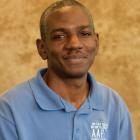In 2000, my husband Bob and I had the opportunity to participate in a missions conference held in Nairobi, Kenya, leading seminars on developing ministry with graduate students and faculty. There we met an engaging student, Tony Musumba and kept in touch as he pursued graduate work. It has been a joy to observe his journey in the academy and ministry over the years. Tony, his wife, Alice, and their family have attended several faculty conferences and I wanted to to share here some of Tony’s enthusiasm for ministry.
GFM: Hello, Tony. Thank you for sharing some of your story with us. Can you tell our readers about your current position and how you were led to pursue the work you are doing?
Tony: I teach physics at Bismarck State College. I mostly work with sophomores in my physics classes. I grew up in Kenya and did my undergrad and graduate studies at Moi University. My parents were college educated and were teachers. I credit my mum with creating an intellectually stimulating environment at home. I was interested in everything when I was growing up and when I moved on to high school, I studied humanities and sciences in what was a new system of education in Kenya; the 8-4-4 system (signifying years of elementary, secondary, and university education). I did not plan on becoming a physicist when I was an undergrad but by the process of elimination, I narrowed down my options to physics and mathematics. During my time in college the physics classes were much more challenging so I opted for physics.
GFM: Describe mentors or people along the way who modeled for you or influenced you in living out faithfulness to God and to work in the academy?
Tony: I have had countless mentors because I enjoy social interactions. I will single out on-campus mentors in ministry and work but I have also had some influential mentors who have spent time with my wife, Alice, and me as a couple. I find that mentoring has occurred for me in community and this started in graduate school with my dissertation committee. I spent a lot of time with my advisor but I had a large committee because I valued the input of various people.
At Intervarsity I have had the pleasure of working with the Graduate and Faculty Ministry staff. Bob and Deb Clark have been buddies from my graduate days in Kenya until now. I am fascinated by how Bob and Deb work so well together. In recent years the GFM staff in the Midwest region, especially Melodie Marske, have been a great encouragement. Taking time apart to be refreshed at the Cedar Campus Faculty Conference with other faculty has been a highlight of my summer.
When I came to the US I was involved initially in International Student Ministry (ISI) and again my mentors were a community of volunteers in ministry and ISI staff. I have had some wonderful interactions with GFM staff and undergraduate staff in my eleven years of ministry at Bismarck State College.
GFM: Tony, you have consistently taken the approach that you are an academic on campus, but you are also a person of ministry. How would you describe this?
Tony: My involvement primarily with Intervarsity and FOCUS-Kenya (the International Fellowship of Evangelical Students (IFES) IFES equivalent of InterVarsity) has shaped how I have grown as an academic and a person of ministry. I take seriously the four commitments of Graduate and Faculty Ministry(GFM): Spiritual formation, community, evangelism and service, and integration of faith, learning, and practice. I have leaned on my local Christian community and the national GFM community. To be a person of ministry and an academic is contingent on being in community.
GFM: How have you understood your position as an academic with a Christian witness on campus?
Tony: First off I love the university campuses of the world—going to any university for me is like going to a museum. I like to walk the hallways, listen to students chatting, playing Frisbee, etc. I cannot remember a time in my life that I did not enjoy going on to a campus and just hanging out. In my undergraduate chapter of FOCUS-Kenya, the staff and students helped me start a journey of living a less bifurcated life, not separating things into spiritual and secular but living in a holistic way. I was a campus pastor with FOCUS when I was in the final dissertation writing stage for my master’s; that one year of career ministry pointed the way to my future involvement on campus.
GFM: How have you interacted with undergraduates/graduates/postgraduates, and faculty? What similarities do you see in working with these groups? How are they different?
Tony: The similarity between undergraduates, graduates, and faculty is the passion for Christ and his word manifested in different ways. Faculty and graduate students may stay at an institution for a long time so they tend to have a long view. The outgoing general secretary of IFES, Daniel Bourdanne, uses the imagery of the university as a pond—faculty may be more aware of the ecosystem and areas in need of healing because they spend more time in the pond. But undergraduates do contribute to nurturing the ecosystem and they should be encouraged not just to fish but to feed the fish and care for the ecosystem in the pond.
GFM: What have been barriers to your engagement on campus? What has been encouraging?
Tony: I have been encouraged to know that God is already at work in our colleges and universities and he calls us to find out where he is working and how we can join him in what he is doing on campus. I think busyness (mine and colleagues) has been a barrier to engagement on campus. We also have to be intentional in seeking to engage—being on campus to listen to the conversations that are happening so we can eventually contribute.
GFM: As you have been a part of planting various groups, what have you learned? what would you recommend to other faculty?
Tony: Recognize that God is at work and he cares about the university more that you do. Begin with prayer and seek to connect with other believers. Gathering faculty from different backgrounds and disciplines to study the bible inductively has really worked well for us in the Midwest.
GFM: What resources might you recommend to other faculty desiring to have a positive Christian influence on their campuses?
Tony: Since I am a bibliophile, I will recommend a couple of IVP books: Professors Who Believe: The Spiritual Journeys of Christian Faculty edited by Paul M. Anderson and Finding God at Harvard: Spiritual Journeys of Thinking Christians edited by Kelly Monroe Kullberg. I highly recommend Vinoth Ramachandra’s books: Gods that Fail: Modern Idolatry and Christian Mission, Faiths in Conflict? Christian Integrity in a Multicultural World, and his blog. Vinoth is the IFES secretary for dialogue and social engagement and he constantly challenges me and academics to have dialogue with the people and ideas in the university. I look forward to Francis Su’s book due out in December of 2019, Mathematics for Human Flourishing. I would also encourage listening to Francis on YouTube. Last and by no means least I encourage faculty to connect with GFM staff and the myriad resources offered on InterVarsity GFM website.
GFM: Thanks Tony!



